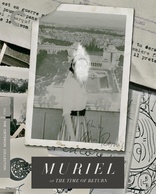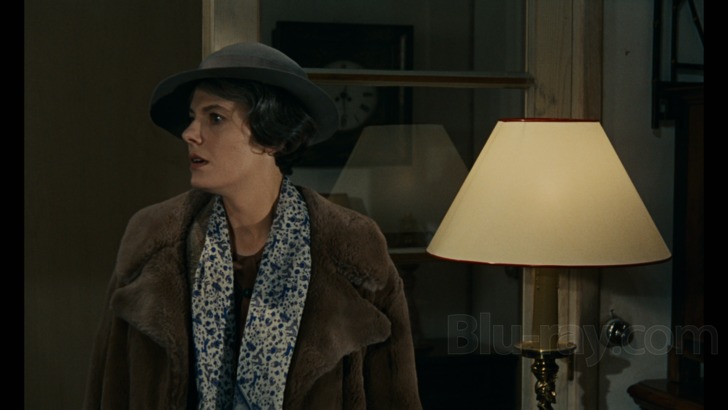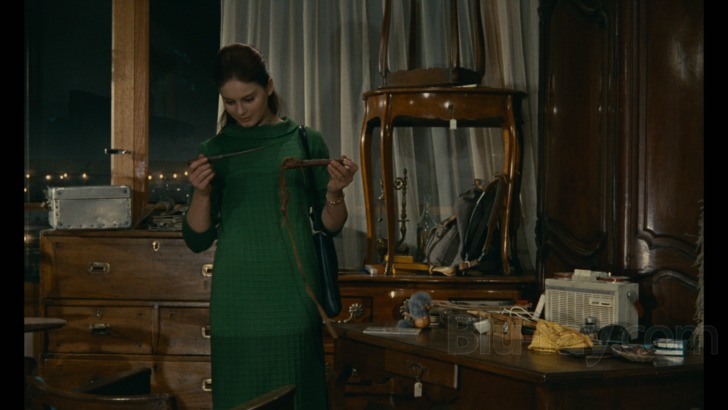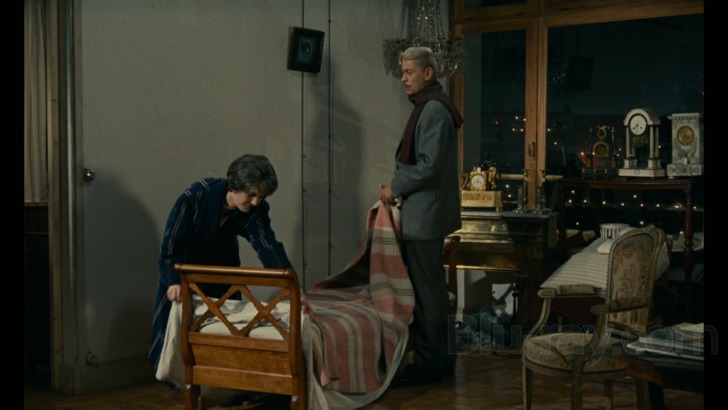Muriel, or the Time of Return Blu-ray Movie
HomeMuriel, or the Time of Return Blu-ray Movie 
Muriel ou le temps d'un retourCriterion | 1963 | 117 min | Not rated | Jul 19, 2016

Movie rating
7.2 | / 10 |
Blu-ray rating
| Users | 4.5 | |
| Reviewer | 3.0 | |
| Overall | 3.5 |
Overview
Muriel, or the Time of Return (1963)
Delphine Seyrig stars as an antique shop owner and widow in Boulogne-sur-Mer, whose past comes back to haunt her when a former lover reenters her life. Meanwhile, her stepson is tormented by his own ghosts, related to his service in France’s recently ended war in Algeria.
Starring: Delphine Seyrig, Claude Sainval, Laurence Badie, Jean Champion, Philippe LaudenbachDirector: Alain Resnais
| Foreign | Uncertain |
| Drama | Uncertain |
Specifications
Video
Video codec: MPEG-4 AVC
Video resolution: 1080p
Aspect ratio: 1.66:1
Original aspect ratio: 1.66:1
Audio
French: LPCM Mono (48kHz, 24-bit)
Subtitles
English
Discs
50GB Blu-ray Disc
Single disc (1 BD)
Playback
Region A (locked)
Review
Rating summary
| Movie | 2.0 | |
| Video | 5.0 | |
| Audio | 5.0 | |
| Extras | 4.0 | |
| Overall | 3.0 |
Muriel, or the Time of Return Blu-ray Movie Review
A frustrating film with an exceptional presentation by Criterion
Reviewed by Neil Lumbard September 30, 2019The third film of acclaimed filmmaker Alain Resnais (Last Year at Marienbad, Hiroshima Mon Amour), the story focuses on the daily lives of a family living in Boulogne. Told with many fragmented sequences, the film features a narrative about the family's daily experiences and their struggles with their individual pasts. Produced by Anatole Dauman (Wings of Desire, Until the End of the World), the filmmaking reflects the experimental style of Resnais and his fascination with the idiosyncrasies of time.
Hélène Aughain (Delphine Seyrig) transformed her own apartment into an antiques room where she sells off her own personal belongings in order to raise money. She struggles with her day-to-day life and even her cherished dishes are sold. A former lover, Alphonse Noyard (Jean-Pierre Kérien) newly reenters her life and takes on a brand new role that transforms their relationship. Meanwhile, Hélène's stepson Bernard Aughain (Jean-Baptiste Thierrée) struggles with his memories and recounts his own participation in the assault of Muriel (the unseen girl from which the title of the film is taken) during the Algerian War.
There is a striking simplicity in the film that is uncommon. Though the storytelling focuses on the intertwined lives of several characters, there is no sense of narrative drive behind it. Scenes unfold with the characters as they go about their daily lives and experiences: moving about their home and moving throughout the city streets with shuffling feet. Characters explore their own inner turmoils and shattered memories of the past and yet the film feels like it has nothing definitive to say about these reflections. It leaves it all to the viewer. This may be of importance to Alain Resnais and his approach to cinema. However, it makes Muriel, or The Time of Return a frustrating cinematic experience.

Entering the Void
Though there are many elements of the filmmaking which were frustrating, there are positive elements which showcase the film's artistic merits as well. The music score composed by Hans Werner Henze (Love Unto Death, Comrades) fits the filmmaking like a well-worn glove. The cinematography by Sacha Vierny (The Pillow Book, Belle de Jour) is radiant and as beautiful as a framed piece of art. Throughout the experience, the production design by Jacques Saulnier (Swann in Love, Same Old Song) feels intricately constructed and it is clear that an enormous degree of detail is present in the production aesthetic.
Edited by Kenout Peltier (La Rapace, Going Places) and Eric Pluet (The Game of Solitaire, The War Is Over), the film reportedly has around 1,000 shots which are constructed in the narrative. This is a huge number of individual shots. There is something baffling and frustrating about the exorbitant shot count. This makes many scenes feel fragmented and idiosyncratic. The concept may have been to reflect the film's narrative structure on memory by having a constant wave of brief shots assembled, yet this is something which causes more frustration than admiration. It's as though the film lacks the kind of attention span necessary for a great narrative drive at its foundation. What's even more surprising is how the massive shot count does not reflect the leisurely pace of the storytelling itself.
Alain Resnais directs from the screenplay by Jean Cayrol (Night and Fog, Le coup de grâce) and his experimental style is on display within a traditional and simplistic structure. The film follows a plain rhythm which is without glamour or radical narrative structure. Looking at the film through the prism of examining the director's technique, one can see how Resnais is playfully engaging in his artistic style. There is no doubt this is the work of an auteur director playing with his personal chess board. Resnais moves the chess pieces of the fragmented sequences at his own leisurely pace. Yet one can't help but feel as though the audience was not on the filmmaker's mind. Dull, overlong, and downright frustrating, Muriel, or The Time of Return is the rare type of film which demands a re-viewing from its audience but does not deserve it.
Muriel, or the Time of Return Blu-ray Movie, Video Quality 

Muriel, or The Time of Return features a 1080p MPEG-4 AVC encoded high definition presentation in the theatrical aspect ratio of 1.66:1 widescreen. The film has received a 4K restoration. The transfer of the 35mm original camera negative was completed using an ARRISCAN film scanner. Criterion has completely knocked it out of the park again with another prime showcase for why the label is one of the best in the business.
This is a stunning 4K scan which approaches perfection with relative ease. There are no signs of print damage or wear to be found on the 4K scan. The print is entirely devoid of scratches and detrimental anomalies. No DNR is present. The transfer looks naturally filmic throughout with a fine layer of film grain preserved. Color reproduction is exceptional. The encode quality is equally superb and shows no compression artifacts. This is a first-rate transfer that will leave no fans of the film disappointed.
Muriel, or the Time of Return Blu-ray Movie, Audio Quality 

The audio on Muriel, or The Time of Return is presented in 24 bit high-resolution. This is an uncompressed PCM mono track. The lossless audio track sounds remarkably crisp. Dialogue is clear throughout the presentation and is easy to understand. The film has received a notable clarity boost with this high-fidelity encode. Criterion restored the audio track using the 35 mm audio soundtrack negative. There are no disappointing drawbacks to this audio track and it's clear that Criterion went the extra mile on the presentation. From the music to the natural outdoor sounds, everything about this track shines magnificently. What a joy it is to hear such precision.
Muriel, or the Time of Return Blu-ray Movie, Special Features and Extras 

Une Approche D'Alain Resnais, Revolutionnaire Discret (SD, 4:43) is a short excerpt taken from a documentary which was produced for television broadcast. This piece explores the work of director Alain Resnais and his filmmaking style throughout his career. The footage was directed by Michel Leclerc and features screenwriter Jean Cayrol as he discusses his collaboration with the filmmaker. Despite the brevity of the supplement, I found it to be an engaging supplement which offers viewers some interesting insights from the screenwriter. Cayrol engages with a conversational tone that keeps the piece informative and entertaining.
L'Invite Du Dimanche (SD, 4:11) features actress Delphine Seyrig discussing her role in Muriel, or The Time of Return and her other collaborations with the director. This excerpt was taken from a television program, L'invite du dimanche. This interview provides viewers with some interesting insights into her part (including a discussion about the differences between her roles in Muriel, or The Time of Return and in Resnais's Last Year at Marienbad).
Discorama (SD, 4:18) features an interview with composer Hans Werner. This is a highly insightful extra which explores the way in which this Opera composer transitioned to film scoring and his views on the role of a score in a feature-film production (both as a collaborative component to the storytelling and as something which should be capable of standing on its own artistic merits). A truly superb piece, any film score enthusiast will find this an interesting supplement worth exploration in regards to film score composition.
Francois Thomas (HD, 27:09) is interviewed about Muriel, or The Time of Return and its place in the pantheon of cinema. The film historian discusses his views on the film and its unique importance in understanding the canon of Alain Resnais. This piece was conducted in Paris in April 2016. For all interested viewers, there are great insights to be had about the filmmaking and its unique approach.
Trailer (HD, 3:55)
Lastly, the release also includes a leaflet featuring production credits, notes on the transfer, and an essay on Muriel, or The Time of Return by film critic James Quandt.
Muriel, or the Time of Return Blu-ray Movie, Overall Score and Recommendation 

There is nothing easy about Muriel, or The Time of Return. Even though there is no doubt this is the work of an auteur filmmaker, there is something frustrating about the film and its glacial pacing, fast-paced editing, and loose narrative. It is a beautifully composed cinematic experience that feels frustratingly incoherent and inessential. Maddeningly difficult, Muriel, or The Time of Return is a narrative misfire that doesn't work.
Though the film is a disappointment, the Criterion Collection Blu-ray release is not. The opposite is true. Fans of the film will be greatly pleased with the exceptional 4K restoration (from the original camera negative) and the superb mono soundtrack. The extras are informative and engaging. This release is a quality one through-and-through. Criterion again proves their commitment to both film preservation and scholarly discussion. While I had a number of reservations with regards to Muriel, or The Time of Return, I do not have any reservations recommending the release to fans.
Similar titles
Similar titles you might also like

The Club
El Club
2015

Loveless
Нелюбовь / Nelyubov
2017

Zama
2017

Horse Money
Cavalo Dinheiro
2014

El Norte
The North
1983

The Painted Bird
Nabarvené ptáce / Slipcover in Original Pressing
2019

Pieta
피에타
2012

Sebastiane
Derek Jarman
1976

The Earrings of Madame de...
Madame de...
1953

Out 1
Out 1, noli me tangere
1971

Woyzeck
1979

Stray Dogs
郊游 / Jiao you
2013

Lourdes
Slipcover in Original Pressing
2009

City of Life and Death
南京!南京! / Nanjing! Nanjing!
2009

Happy End
2017

The Insult
L'insulte
2017

The Class
Entre les murs
2008

Sansho the Bailiff
山椒大夫 / Sanshô dayû
1954

Code Unknown
Code inconnu: Récit incomplet de divers voyages
2000

Ju Dou
1990